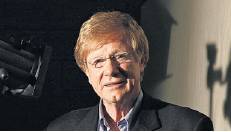O’Brien to reject award over Court decision
Karl Quinn
Kerry O’Brien has rejected the Australia Day honour he was due to receive today in protest at the ‘‘deeply insensitive and divisive decision’’ to give the country’s highest award to Margaret Court, the former tennis great who has preached against LGBTQI+ rights in her work as a Pentecostal minister.
‘‘I believe the decision to award Australia’s highest honour to Margaret Court may serve to erode the hard-fought gains made over decades in reducing the impact of discrimination against members of the LGBTQ+ community,’’ the veteran journalist and former ABC current affairs host wrote in a letter to the office of the Governor-General, David Hurley.
He said such discrimination ‘‘has caused immense pain to untold people and destroyed lives’’.
Mr O’Brien had earlier agreed to accept his appointment as an Officer of the Order of Australia (AO) in today’s official honours. But on Saturday, he wrote to reverse his decision in protest against Court’s elevation in an awards system that had already recognised her achievements as the winner of 24 grand slam singles tennis titles, and her charity work, with an Order of Australia in 2007.
The decision to upgrade that to the nation’s highest honour, a Companion of the Order of Australia (AC), has prompted widespread criticism, including from federal Opposition Leader Anthony Albanese and Victorian Premier Dan Andrews. Ms Court has told Nine News people should separate her religious beliefs from her sporting achievements.
Mr O’Brien said he was declining his award ‘‘in support of Dr Clara Tuck Meng Soo, who is handing back the Order of Australia she received for her work with the LGBTQ+ community and HIV sufferers, in protest. To me Dr Took Meng Soo epitomises the true spirit of the Order of Australia. Her actions speak volumes as to why the Court award is so wrong’’.
Dr Soo is a Canberra-based GP whose work with the LGBTQ+ community and in support of patients with HIV was recognised in 2016.
A trans woman, she wrote for this masthead on the weekend that ‘‘someone elevated to the highest civilian honour in Australia should not only have reached the pinnacle of achievements in their field of endeavour – tennis or otherwise – but should also be considered a role model by the rest of the Australian community. I do not believe someone who has made derogatory and hurtful comments about the LGBTIQ+ community publicly would be regarded as such a role model’’.
The awards as a whole have drawn criticism this year for tending to favour people who have already received more tangible rewards – wealth, power and status, principally. The Governor General himself has suggested the system, first introduced under Gough Whitlam in 1975, needed to be overhauled.
In renouncing his impending award, Mr O’Brien noted that ‘‘there are many well-meaning people involved in the Order of Australia process’’. But, he added, ‘‘there has to be something fundamentally wrong with a system that can produce such a deeply insensitive and divisive decision’’.
